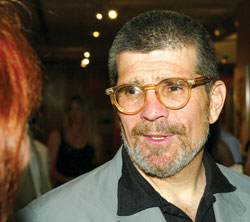My Name Is Rachel Corrie
This one-woman show, adapted by actor Alan Rickman and Royal Court dramaturge Katharine Viner from Corrie’s own journals and e-mails, reveals the young woman behind the headlines, and the journey that led her from small-town Washington to living in the homes of the dispossessed people of the Gaza Strip. The script reveals a woman wise beyond her years, with both a practical view of politics and a playful sense of humor. It’s also unapologetically partisan, a welcome change from the usual version of political theater (the sort that’s against poverty, injustice, racism, and other complex social ills). Like Corrie, the play has had more than its share of controversy. The show premiered at the Royal Court to strong reviews, but the original U.S. production was canceled because the producers got nervous about tackling the subject (it later went on to a successful Broadway run). It’s being directed by the Rep’s literary manager, the man who first brought the script to the theater, Braden Abraham. Seattle Repertory Theatre, 155 Mercer St., 443-2222, www.seattlerep.org. $10–$26. Opens 7:30 p.m. Thurs., March 15. Ends April 22.
The Duchess of Malfi
Open Circle is the fringe company that refuses to grow up, often with delightful results. Artistic director Ron Sandahl has adopted and instigated any number of quirky, chaotic, and potentially psychotic projects during his reign, including dramatized H.P. Lovecraft short stories, a zombie musical, and a charming narrative performed by adults but written by preschoolers, Are We Scared? So they’re a great choice to take on this seldom-performed tragedy by Shakespeare’s contemporary John Webster, a gory and bizarre revenge tragedy that includes psychotic priests, near incest, and, wait for it, lycanthropy. Despite such promising subject matter, the Jacobean verse often leads to productions that are dry as dust or just plain incomprehensible, but neither is likely with director John Kaufmann at the helm. Kaufmann’s best known for his amusingly subversive theater experiments like Line One and Starball, which combine audience participation and improv with a sophisticated use of technology. Watching him give this lyrical but at times frankly ridiculous script some 21st-century CPR should be worth the price of admission. Open Circle Theater, 429 Boren Ave. N, 382-4250, www.octheater.com. $15. Opens 8 p.m. Fri., March 16. Ends April 21.
The Water Engine
Strawberry Theatre Workshop is a professional but pared-down fringe company with a reputation for attracting top-level Seattle artists and, God love them, even paying them a decent wage. Like their recent production of Enemy of the People (see review, p. 49), The Water Engine will showcase artistic director Greg Carter’s talent for matching classic works with current headlines. It’s a minor but gripping one-act fable from David Mamet concerning an inventor in 1930s America who comes up with the Holy Grail of cheap energy: a machine that runs on tap water. As you can expect from Mamet, nothing goes well for our genius, particularly when the patent lawyer he hires lets the news get out to some unscrupulous corporate interests. As per Mamet’s instructions, director M.J. Sieber will stage the show as a live radio play, with actors playing multiple roles and an onstage sound-effects man using period contraptions to create various noises. Strawberry Theatre Workshop, 1634 11th Ave., 800-838-3006, www.strawberrytheatre.org, $15–$20. Opens 7:30 p.m. Thurs., March 22. Ends April 21.
Souvenir
Anyone who’s ever had a chance to hear the infamous recording of Linda McCartney’s blissfully deranged backup singing on “Hey Jude” (the unauthorized bootleg was apparently revenge from a fed-up sound guy) knows just how good bad singing can be. But as tuneless as Linda was, the queen of bad singing was undoubtedly Florence Foster Jenkins. A Pennsylvania socialite born in 1868, Jenkins believed she was gifted with an unparalleled operatic voice, despite what her voice teachers, her parents, and her husband told her. So she began giving public recitals, the first in 1912, and continued to do so until her death in 1944. Critics unanimously agreed that Jenkins had virtually no feeling for pitch or rhythm, and her notes were virtually unsustainable, but she answered that while they said she couldn’t sing, “no one can ever say I didn’t sing.” This new play is an affectionate comedy and the third play in the last decade about the eccentric diva, whose fame has outlasted her critics. It focuses on her relationship late in life with a pianist thought to be just as spectacularly mediocre as herself, and a final sold-out performance at Carnegie Hall. It stars local actor-singer Patti Cohenour, whose own decidedly nonmediocre voice has taken her to Broadway with productions of Light in the Piazza and Edwin Drood. ACT Theatre, 700 Union St., 292-7676, www.acttheatre.org. May 11–June 10.








